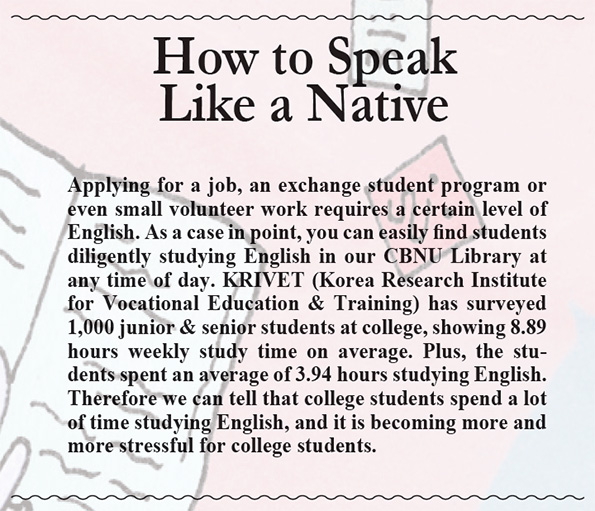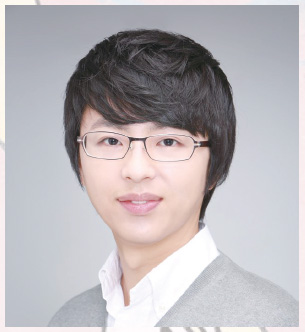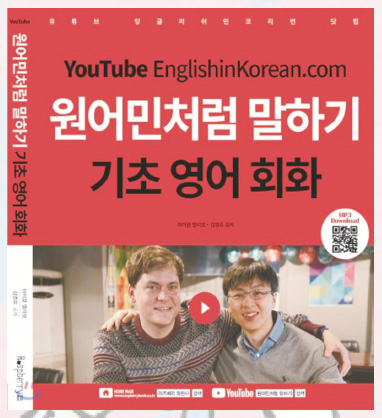

It is almost certainly a given that you, the reader, also suffer from this kind of English stress, and to relieve your stress, CBT met Kim Myung-ho, the writer who has conducted a special lecture on the CBNU campus. He has worked actively since 2004, running an internet cafe ‘My Foreign Friends’ and Facebook group “Danny’s Party”, and he has been holding regular monthly meetings with more than 200 people. Also, he has been consistently posting articles online and in various magazines. Surprisingly, Mr. Kim has never been abroad. CBT interviewed him and tried to find his secret for learning English.
1. CBT heard that you are very active in various channels. Please introduce yourself and tell us what you have done and what you are currently doing.
I am Kim Myung-ho who works in the overseas affairs department of Hyundai Marine & Fire Insurance. I wrote three books of English study, and I am also an English instructor. My English name is Daniel Kim. I have never been to an English-speaking country but I have studied English diligently in Korea. That is why I have become good at English. Based on this, I teach other Koreans how to speak English well without going abroad. Since 2004, I have been hosting language exchanging meetings with foreigners in Korea. I had a lot of off-line lectures, but I am doing more online lectures these days since the COVID-19.
2. Give us a brief introduction to the background of writing the book Speaking like a native.
The book is co-authored with an American friend named Michael Eliot. It is based on the English lectures we gave on Michael’s YouTube channel. Many domestic English study books have awkward and unnatural expressions that native speakers do not use. Therefore, I wrote a book that is full of genuine English expressions that natives really use.
3. CBT heard that you have a lot of foreign friends. Is there any tip for us to make foreign friends?
First, it is a bad idea to simply talk to foreigners on the street and say “Let’s be friends.” because it might bother them and they might consider it is rude. Many of the foreigners in Korea are English instructors, and they don’t want to teach English to strangers after teaching English all day long.
Instead, I recommend you share a hobby, which you are actually interested in, with foreigners. Or if you are an expert in something, go find foreigners who have excellent skills like you. Talk to them, share the common interests and develop the friendship. Your English will improve gradually. Translate your interests, hobbies, and specialties into English. Use those relevant keywords in Facebook, Instagram, etc. Then you will find many foreign friends to share your hobbies with.
For example, if you are very good at taking pictures, it’s good to join a photo club. You can help a foreign friend who is a beginner in photography, even if you cannot speak English very well. Teaching something in English requires a lot of effort. You have to study photography terms or theories in English, and you have to think about how to teach those easily. From that process your English skills will improve as well.
4. We are curious about how you started your YouTube career. You appeared on the co-author Michael Eliot’s channel called Englishnkorea.com, which has 350,000 subscribers.
Many people spend a lot of money on studying English. I have seen many cases in which their English didn’t improve that much. And I didn’t want to experience the phenomenon where wealthy people are likely to have good English abilities while the opposites do not. Therefore, I decided to work with my good friend Michael to teach people the ‘genuine’ English expressions for free. At first, YouTube itself was not famous in Korea, there was no big response. However, as I kept doing things actively, more and more people recognized our good content.
5. Do you have any more English study methods that you didn't share in the book? Tell me about what else you can recommend to college students.
Going abroad is not the only way to enhance English skills. First, focus on developing the power to create sentences. It is important to become familiar with writing and speaking ‘example sentences’ while studying basic grammar. After that, it will be helpful to translate the Korean part of a textbook you like and compare it to the original text of English. Then do it again while focusing on improving the wrong parts. If you still have sentences that are hard to write down, after the repetition, simple memorizing could help you master most of the contents of the book you’re studying. This method will allow you to reach a level of writing and speaking similar to that of the contents of the textbook.
After you get familiar with English, decorate your surroundings into English, encounter English as much as possible, and enhance your English skills by interacting with natives. Even though you’re not good at English, you need to be exposed to an English-speaking environment. It will give you clear motivation, and if you’re determined, good textbooks and lectures are available for free nowadays. In fact, not only offline life but online life is important these days, so try to live in an English environment instead of just a Korean environment.
6. We are curious about your plans for publication of the next book or hosting a special lecture.
I haven’t done lectures in an academy, but I got a job offer to be a lecturer from a language institute. I’m seriously considering that at the moment. I’m planning to publish a new English study book next year, and if the Corona-related situation permits, I would like to host special or normal lectures in various forms.
7. Lastly, please feel free to speak openly to college students who want to be good at English.
Focusing on building foreign language skills above a certain level during the time of youth has a great impact on your life. There certainly is a window of opportunity, so the younger you start, the better. No matter how advanced the translator using AI, it would not be easy to completely replace direct human interaction. Of course, AI translators will become more and more advanced in the near future and reach a significant level, but humans fundamentally crave interaction with other humans, not with machines. I don’t think AI will be able to replace humans completely in all situations, and even if it does, learning a language enriches your life. Also, in terms of experience and economy, it often has a largely positive impact.
If you overcome the uphill ‘studying’ part of the beginning, you can improve your English while enjoying it. Although you have deficiencies, you have learned English for a long period via public education. Therefore you should try to improve your English level while you’re in college. You guys will thank me later.

By Baek Han-na l backna@cbnu.ac.kr
By Park Ji-min l jm41@cbnu.ac.kr


 All
All People
People






 Baek Han-na&Park Ji-min
Baek Han-na&Park Ji-min











